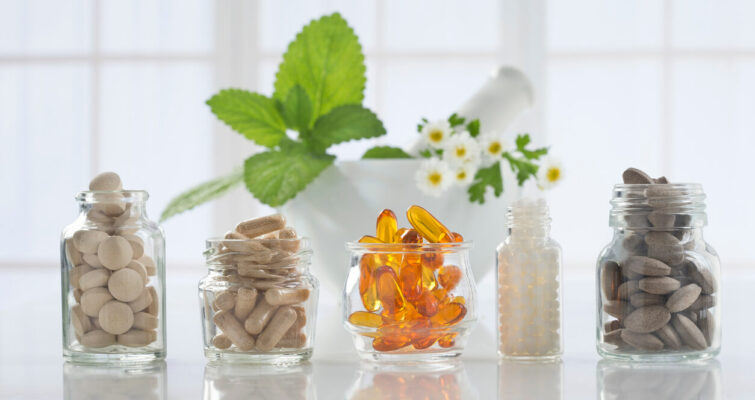Menopause is a natural stage of life, but the symptoms that come with it—hot flashes, mood swings, sleep disturbances, and hormonal shifts—can feel anything but natural. While conventional treatments like hormone replacement therapy (HRT) are effective for some, many women are turning to herbal remedies to seek relief with a more holistic approach. But are all herbal medicines safe and effective for menopause? And how can you use them correctly?
This guide dives into the world of herbal medicine for menopause, exploring what’s safe, what’s not, and how holistic health practices can empower you during this phase of life.
Why Choose Herbal Remedies for Menopause?
Herbal medicine offers a natural way to manage symptoms without the potential side effects of synthetic medications. Many herbs work to gently balance hormones, improve mood, and reduce physical discomfort (1,2). Plus, as awareness of holistic health grows, more women are drawn to solutions that align with their values of natural living.
However, “natural” doesn’t always mean “safe.” It’s vital to make informed decisions about the herbs you use, as some can interact with medications, intensify symptoms, or simply be ineffective.
The Pros of Herbal Remedies:
- Natural hormone balance
- Minimal side effects when used correctly
- Easily integrated into daily routines, such as teas or supplements
- Access to a broad range of herbs targeting various symptoms
The Cons:
- Potential interactions with medications
- Quality can vary between brands
- Results may take longer than conventional treatments
Related: 6 Ways to Use Herbs in Your Daily Routine
5 Generally Safe Herbal Remedies for Menopause Relief
Here are five trusted herbal remedies that have stood the test of time—and science—for managing menopause symptoms. With that said, it’s still important that you consider your individual biology, and I always recommend working with a qualified herbalist to make sure you’re choosing the right remedies.
1. Black Cohosh (Cimicifuga racemosa)
Known as one of the best herbs for menopause, black cohosh is commonly used to treat hot flashes and night sweats (2). Studies suggest it may help women by mimicking a gentler form of estrogen, though it does not contain actual hormone-like compounds. It’s especially popular among women who can’t or prefer not to use HRT.
Caution: Avoid if you have liver issues or are taking prescription medication—consult a qualified herbalist first.
2. Red Clover (Trifolium pratense)
Rich in plant-based compounds called isoflavones, red clover may help reduce hot flashes and improve bone health (3). These isoflavones act as phytoestrogens, helping mimic the effects of estrogen in the body. There is some debate about how phytoestrogens support women’s health—you can learn more here!
How to Use: Brew it into tea or take in supplement form for maximum effect.
3. Dong Quai (Angelica sinensis)
Sometimes called “female ginseng,” dong quai is revered in traditional Chinese medicine for supporting hormone regulation and boosting energy. This herb can help balance mood swings and reduce menstrual-like cramping during perimenopause.
Caution: It can have blood thinning effects, so avoid if you’re on blood-thinning medications or prone to bleeding issues.
Related: The Definitive Guide to Hormone Wellness in Your 40s
4. Sage (Salvia officinalis)

Sage is a powerhouse for combating hot flashes and excessive sweating (4). It’s easy to find as a tea or dietary supplement and has been used for centuries for its cooling effects.
Plus, it supports memory and mental clarity, two areas that menopause can sometimes affect.
5. Ashwagandha (Withania somnifera)
This adaptogen superstar helps regulate your body’s stress response, making it invaluable for menopause-related anxiety, poor sleep, and fatigue. Ashwagandha works holistically by stabilizing cortisol and supporting overall hormonal health.
Since stress can really increase during phases of hormonal shifts, it’s helpful to have as many stress-relieving tools in your routine as possible.
Herbs to Avoid During Menopause
While many herbs are safe, some can cause complications during menopause—especially without proper guidance.
- St. John’s Wort: Often used for mood swings, this herb interacts with many medications, including antidepressants.
- Licorice Root: Although helpful for adrenal fatigue, licorice root can raise blood pressure and should be avoided by anyone with hypertension (5).
Always consult with a qualified functional medicine doctor or herbalist before introducing these herbs into your routine.
Tips for Using Herbal Medicine Safely
If you’re new to herbal remedies, follow these tips to maximize their effectiveness and minimize risks.
1. Consult with a Holistic Practitioner
A holistic doctor or herbalist can guide you toward the right herbs and dosages based on your unique health needs and lifestyle. If you’d like to work with an experienced herbalist, learn more here.
2. Prioritize Quality
Always purchase herbs from trustworthy sources. Look for certified organic products and brands with third-party testing to ensure purity and efficacy.
3. Go Slow and Listen to Your Body
Start with low doses and pay attention to how your body reacts. Herbal remedies are gentle but require patience—they can take weeks to deliver noticeable results.
4. Stay Consistent
Herbs work best when taken consistently over time. Incorporate them into your daily routine to achieve maximum benefits.
5. Watch for Interactions
Always cross-check herbs with any existing medications you’re taking. Even natural remedies can interact with prescription drugs.
Building Your Holistic Health Toolbox
Menopause is more than just a physical transition—it’s also an emotional and mental one. Alongside herbal remedies, consider incorporating other holistic practices to thrive during this phase of life.

- Yoga and Meditation: These can help reduce stress and improve overall well-being.
- Balanced Diet: Focus on whole foods rich in protein, omega-3s, and phytoestrogens (e.g., flaxseeds). Choose fiber-rich carbs (like fruits & whole grains) instead of refined carbohydrates like bread & rice.
- Hydration: Drink plenty of water to help combat hot flashes and maintain healthy skin.
- Community: If we’re going to collectively change the stigma around natural hormone shifts during menopause, it’s crucial to reach out for connection and shared experiences. It’s not something to hide!
Empower Your Menopause Journey Naturally
Navigating menopause with herbal medicine offers a powerful tool for managing symptoms and reclaiming your sense of balance. With the right herbs, safe practices, and guidance from holistic health experts, you can transform this chapter into a time of renewal and growth.
If you’re ready to explore personalized herbal remedies, start by consulting a qualified holistic medicine practitioner to create a plan tailored to your needs. Empower yourself through natural solutions—because you deserve to feel your best during every stage of life.


